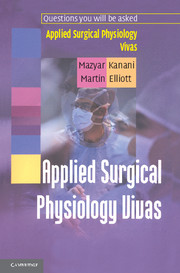Book contents
- Frontmatter
- Contents
- List of Abbreviations
- Dedication
- Preface
- A Change in Posture
- Acid-Base
- Action Potentials
- Adrenal Cortex I
- Adrenal Cortex II – Clinical Disorders
- Adrenal Medulla
- Arterial Pressure
- Autonomic Nervous System (ANS)
- Carbon Dioxide Transport
- Cardiac Cycle
- Cardiac Output (CO)
- Cell Signalling
- Cerebrospinal Fluid (CSF) and Cerebral Blood Flow
- Colon
- Control of Ventilation
- Coronary Circulation
- Fetal Circulation
- Glomerular Filtration and Renal Clearance
- Immobilization
- Liver
- Mechanics of Breathing I – Ventilation
- Mechanics of Breathing II – Respiratory Cycle
- Mechanics of Breathing III – Compliance and Elastance
- Mechanics of Breathing IV – Airway Resistance
- Microcirculation I
- Microcirculation II
- Micturition
- Motor Control
- Muscle I – Skeletal and Smooth Muscle
- Muscle II – Cardiac Muscle
- Nutrition: Basic Concepts
- Pancreas I – Endocrine Functions
- Pancreas II – Exocrine Functions
- Potassium Balance
- Proximal Tubule and Loop of Henle
- Pulmonary Blood Flow
- Renal Blood Flow (RBF)
- Respiratory Function Tests
- Small Intestine
- Sodium Balance
- Sodium and Water Balance
- Starvation
- Stomach I
- Stomach II – Applied Physiology
- Swallowing
- Synapses I – The Neuromuscular Junction (NMJ)
- Synapses II – Muscarinic Pharmacology
- Synapses III – Nicotinic Pharmacology
- Thyroid Gland
- Valsalva Manoeuvre
- Venous Pressure
- Ventilation/Perfusion Relationships
Starvation
Published online by Cambridge University Press: 06 January 2010
- Frontmatter
- Contents
- List of Abbreviations
- Dedication
- Preface
- A Change in Posture
- Acid-Base
- Action Potentials
- Adrenal Cortex I
- Adrenal Cortex II – Clinical Disorders
- Adrenal Medulla
- Arterial Pressure
- Autonomic Nervous System (ANS)
- Carbon Dioxide Transport
- Cardiac Cycle
- Cardiac Output (CO)
- Cell Signalling
- Cerebrospinal Fluid (CSF) and Cerebral Blood Flow
- Colon
- Control of Ventilation
- Coronary Circulation
- Fetal Circulation
- Glomerular Filtration and Renal Clearance
- Immobilization
- Liver
- Mechanics of Breathing I – Ventilation
- Mechanics of Breathing II – Respiratory Cycle
- Mechanics of Breathing III – Compliance and Elastance
- Mechanics of Breathing IV – Airway Resistance
- Microcirculation I
- Microcirculation II
- Micturition
- Motor Control
- Muscle I – Skeletal and Smooth Muscle
- Muscle II – Cardiac Muscle
- Nutrition: Basic Concepts
- Pancreas I – Endocrine Functions
- Pancreas II – Exocrine Functions
- Potassium Balance
- Proximal Tubule and Loop of Henle
- Pulmonary Blood Flow
- Renal Blood Flow (RBF)
- Respiratory Function Tests
- Small Intestine
- Sodium Balance
- Sodium and Water Balance
- Starvation
- Stomach I
- Stomach II – Applied Physiology
- Swallowing
- Synapses I – The Neuromuscular Junction (NMJ)
- Synapses II – Muscarinic Pharmacology
- Synapses III – Nicotinic Pharmacology
- Thyroid Gland
- Valsalva Manoeuvre
- Venous Pressure
- Ventilation/Perfusion Relationships
Summary
1. What is the difference between starvation, fasting and cachexia?
Starvation is a chronic state resulting from inadequate intake of energy
Fasting is a state of energy deprivation lasting no more than several days
Cachexia is the state resulting from a chronic deprivation of energy and nutrients irrespective of the adequacy of intake, e.g. in malignant cachexia, there is protein and energy malnutrition even when there is adequate intake of food
2. What is the basic difference between marasmus and kwashiorkor?
Marasmus is characterised by inadequacy of all nutrients and energy sources
Kwashiokor is characterised by a lack of protein, but there is some intake of energy sources
3. During a period of fasting, from which source does the body obtain glucose?
From glycogen, found most abundantly in the liver and skeletal muscle.
4. How long does this supply last?
About 24 h.
5. When this supply is exhausted, why doesn't the body become hypoglycaemic?
Because, through gluconeogenesis, the liver is able to convert some molecules into glucose.
6. What are the substrates for gluconeogenesis?
Glycerol: which is released from the breakdown of triglycerides
Amino acids: from the so-called glucogenic amino acids, such as alanine
Lactate: production of which is increased following fasting and starvation
7. What is the result of fasting on the body's store of protein and fat?
- Type
- Chapter
- Information
- Applied Surgical Physiology Vivas , pp. 145 - 147Publisher: Cambridge University PressPrint publication year: 2004



